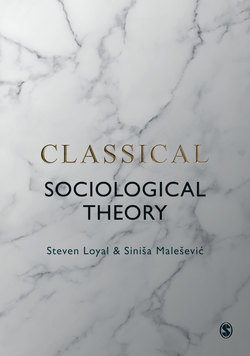Читать книгу Classical Sociological Theory - Sinisa Malesevic - Страница 37
На сайте Литреса книга снята с продажи.
Medieval North Africa
ОглавлениеJust as with Confucius, Ibn Khaldun’s intellectual project owes a great deal to the historical, political and ideological turbulence of his times. The fourteenth century was a period of protracted crisis in North Africa, a region which in many respects was unlike the rest of the medieval Muslim world. Since the large-scale rebellion of the 730s, inspired by the egalitarian heretic teachings of Kharijism, the rulers of the Maghreb were politically independent from the caliphs of Baghdad and Damascus. This autonomy was rooted in economic strength, as the region was the epicentre of Middle Eastern and Mediterranean trade for centuries. In addition the rulers of the Maghreb kingdoms controlled the gold trade as they had a monopoly on the routes to the Western Sudan’s gold, destined for European and Middle Eastern merchants (Lacoste, 1984: 16). The direct consequence of this trading monopoly was the substantial growth of towns such as Fez, Tlemcen, Bougie, Constantine, Tahert or Kairouan, the centres of prominent medieval kingdoms. However, unlike the relatively centralised imperial orders of the Mamluk Sultanate in Cairo or the Ottoman Empire, the North African kingdoms were largely decentralised entities where the rulers controlled the towns and the main trading routes, while the local tribal groupings maintained a wide degree of autonomy. More specifically, unlike feudal Europe where warrior lords controlled vast swaths of peasantry and were all in turn immersed in personal vassalage relations, in North Africa the tribe was the locus of power and solidarity.
Hence, it was not individuals but ‘the tribe that was subject to the chieftain who had granted the right to raise taxes’ (Lacoste, 1984: 21). In this context, the power of individual rulers was heavily dependent on their ability to negotiate with the chieftains of different tribes and their power base was firmly rooted in their tribal group. Simply put, the kings were essentially tribal leaders who assumed control of a confederation of several tribes. The rise of the Almohad Empire in the twelfth century temporarily changed the political landscape of North Africa as the Almohad dynasty unified the Maghreb in 1120. The Almohad period was characterised by a degree of cultural renaissance and the establishment of new universities teaching Greek and Roman philosophy, science, geometry, astronomy and the arts, development of novel artistic and architectural forms, and advancements in jurisprudence and Islamic theology. The leading philosophers of the medieval world found their intellectual home in the Almohad Empire including such distinguished neo-Aristotelians as Averroes (Ibn Rusd), and the Jewish philosopher Maimonides. This period was remembered as the golden age of the Maghreb.
Ibn Khadun was coming of age at the time when the well-established stability of the Hafsid dynastic order was dramatically and substantially undermined by the rising Marinid dynasty, and the neighbouring Zayyanid powers, all struggling to establish entire control of North Africa. Furthermore the inter-dynastic claims within the Hafsid royal court triggered internal conflicts which led to the fragmentation of Hafsid territories under different claimants to the throne. This situation triggered a scramble for territories between different political actors including neighbouring kingdoms, distinct dynastic claimants, and nomadic and semi-nomadic tribal groupings inhabiting the Maghreb region. All these radical geopolitical changes created long-term instability with constant shifts in alliances between rival sides. More significantly, the geopolitical volatility brought about new social realities where on the one hand, no single political power could establish its hegemony and, on the other, the rulers were forced to compromise with different social groups and extend some rights and privileges to non-aristocrats. More specifically, various dynastic claimants welcomed to their courts talented individuals, some of which were without patrician credentials.
